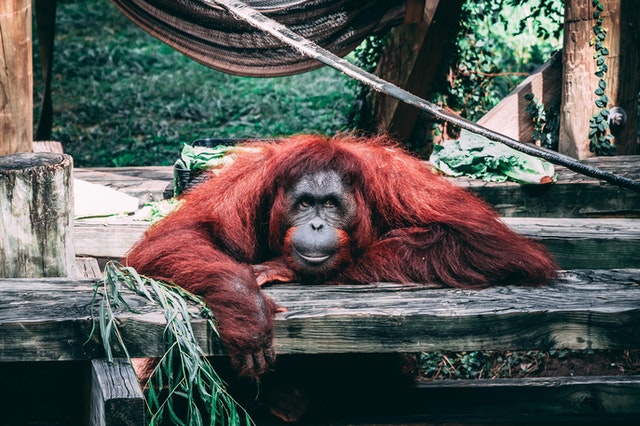This article is written in partnership with milkadamia. They’re dedicated to helping everyday people make food choices as if the well-being of the Earth depends on them, every day (because, well, it does). We could not be prouder to work with them. ~ ed.
When the great ships come back,
and come they will,
when they stand in the sky
all over the world,
candescent suns by day,
radiant cathedrals in the night,
how shall we answer the question:
What have you done
with what was given you,
what have you done with
the blue, beautiful world? ~ Theo Dorgan
There is a crisis big enough to dwarf every single disaster we’ve already faced in 2020.
It’s happening right this second, right under our noses, and we are funding it every time we visit the supermarket.
The Palm Oil Problem We’re All Part Of (Yes, Even Vegans)
Forests across Malaysia, Indonesia, parts of Africa, and, more recently, Papua New Guinea are being obliterated at a dizzying rate of 4,000 square feet a second.
That number can be hard to visualize, so picture this: every hour, the equivalent of 300 football fields of indigenous forest in some of the most sensitive and unique ecosystems of the world are being burned to the ground. Many of these forests are not only home to animals like orangutans, Sumatran tigers, and tree kangaroos, but are also sitting on acres of carbon-rich peatland—carbon which is released into the atmosphere together with the choking smoke from fires lit by our shopping habits.
It comes back to us because these forests are being burned to make room for our chocolates, cereals, ice cream, tortilla chips, and toothpaste—all of which contain palm oil.
“Palm oil is in close to half of the products we buy in the supermarkets—in everything from shampoos and soaps, to pizzas and biscuits. It’s everywhere.” ~ Dr. Emma Keller, World Wide Fund for Nature (WWF)
We each consume an average of 8 kilograms of palm oil a year. Most of us have no idea of the scale of our palm oil habit simply because labeling has been historically unclear, with mega-players like Nestlé pushing to keep it that way.
Today, depending on where in the world you are, where the product you’re consuming was made, and what type of product it is, you may see names like PKO (palm kernel oil), OPKO (organic palm kernel oil palmitate), sodium laureth sulfate (also made from coconut oil), stearic acid, vegetable oil…the list goes on.
According to the self-declared “palm oil watchdog,” Palm Oil Investigations, there are more than 200 common ingredients in food and home and personal care products that contain palm oil, and only about 10 percent of them include the word “palm.”
How Did We Get So Addicted to Palm Oil?
The “modern-day gold rush” for palm oil began when we started to fall out of love with high saturated fats like butter (which, of course, has its own environmental and ethical toll) after scientists in the 1960s began warning us they may increase the risk of heart disease.
This, in turn, led to a widespread replacement with processed foods like margarine, made with lower saturated fat vegetable oils. But, by the early 1990s, scientists discovered that eating this kind of fat was creating a whole other health problem even worse than saturated fat: trans fat. Big producers like Unilever soon made the switch to the health favorable, but still cost-effective solution of palm oil.
Today, more than two-thirds of palm oil produced globally goes into food. Food you then buy at the grocery store—even in many “vegan” products—thereby funding the destruction of some of the world’s most valuable and vulnerable ecosystems.
Palm oil dominates because of a combination of factors: it comes from a reliable and hardy plan and is relatively cheap to produce—growing well in many developing parts of the world. It is also incredibly stable and versatile as a commodity, being used for everything from biofuels (ironically, because of its environmental toll) to food additives and surfactants.
“Palm oil has become ubiquitous because it is the perfect ingredient for a number of growing industries, the perfect export for developing economies, and the perfect commodity for the globalised economy that links them. Wealthy consumers are capitalising on the cheap labour and valuable rainforest that developing nations have in abundance and are willing to part with at a discount to accelerate their economic growth.” ~ Paul Tullis, The Guardian
What About Sustainable Palm Oil?
Despite efforts made by the Roundtable on Sustainable Palm Oil (RSPO) since their establishment in 2004, they were found to be “woefully substandard” and “in some cases … colluding…to disguise violations” in a 2016 report by the Environmental Investigation Agency, an offshoot of Greenpeace.
Besides the muddied waters of supply chains which make it nearly impossible to ensure palm oil is being sustainably produced, even when it is labelled “sustainable,” the irrefutable fact is that in order for palm oil to be produced, forests must be destroyed. As regenerative farming activist and plant-based company milkadamia put it, “The only thing sustainable about palm oil is the environmental devastation it causes.”
No Palm Oil (Ever)
The palm oil rabbit hole goes pretty deep and there is some disagreement, even amongst sustainability advocates, about what the solution is. Right now, as it stands, a few things are clear:
- There is no such thing as sustainable palm oil.
- We as consumers have the power to reduce global demand for palm oil.
- Big brands change their behaviour quickly when consumer demand dictates it (refer to the fall of margarine for proof).
- It’s up to us to do our homework: not knowing is no longer an excuse.
So check out all the label variants of palm oil, and whether it’s an obviously unhealthy (for you and the planet) Kit Kat bar or a secretly unsustainable bag of vegan tortilla chips, read the label, and put it back on the shelf. Choose products that contain no palm oil.
Because the fires will keep burning until we say no.
It’s a pretty simple choice, as Center for Orangutan Protection director, Ramadhani explains, “his eyes welling up with tears.”
“Please no more. Just stop it…I think it’s enough palm oil in here. My dream is in 20 years, I bring my daughter, (and) go to the forest…Real forest where they can eat fruit, they can see the animals, real animals, not in a zoo. I want my daughter to see that.”
Sources/recommended further reading:
https://milkadamia.com/itsrchoice/the-problem-with-palm-oil/
https://www.theguardian.com/news/2019/feb/19/palm-oil-ingredient-biscuits-shampoo-environmental
https://www.greenbiz.com/article/can-asia-make-sustainable-palm-oil
https://palmfreecouncil.com/2020/03/whats-wrong-with-the-rspo/
https://www.nytimes.com/2018/11/20/magazine/palm-oil-borneo-climate-catastrophe.html
https://www.rainforest-rescue.org/topics/palm-oil
https://edition.cnn.com/interactive/2019/11/asia/borneo-climate-bomb-intl-hnk/
https://www.bbc.co.uk/newsround/39492207
https://psmag.com/environment/brands-are-not-living-up-to-their-palm-oil-promises
https://issuu.com/greenpeaceinternational/docs/final_countdown_pages_lr_greenpeace
https://www.euronews.com/living/2019/11/05/eco-friendly-palm-oil-is-a-con-greenpeace
https://www.ran.org/the-understory/palm_oil_s_dirty_secret_the_many_ingredient_names_for_palm_oil/



Read 13 comments and reply